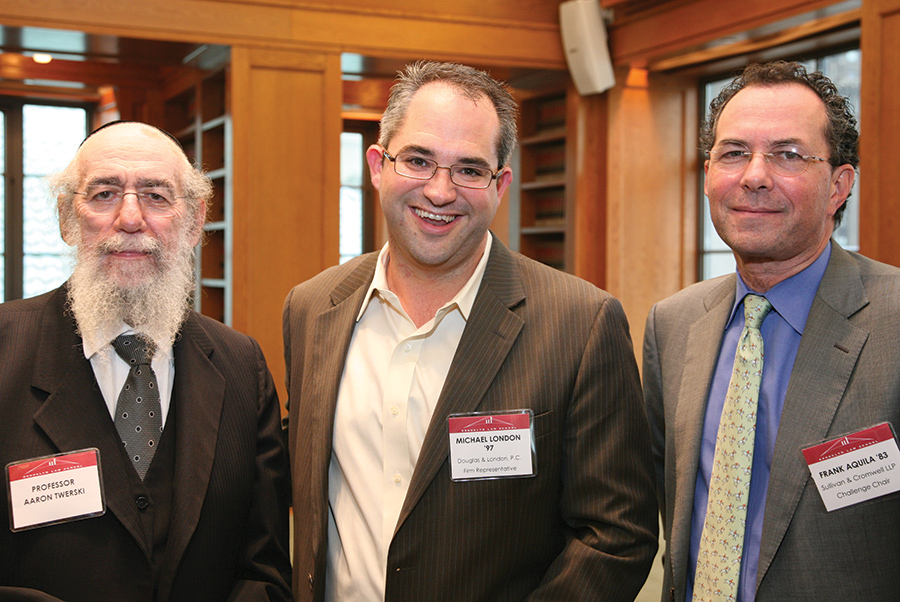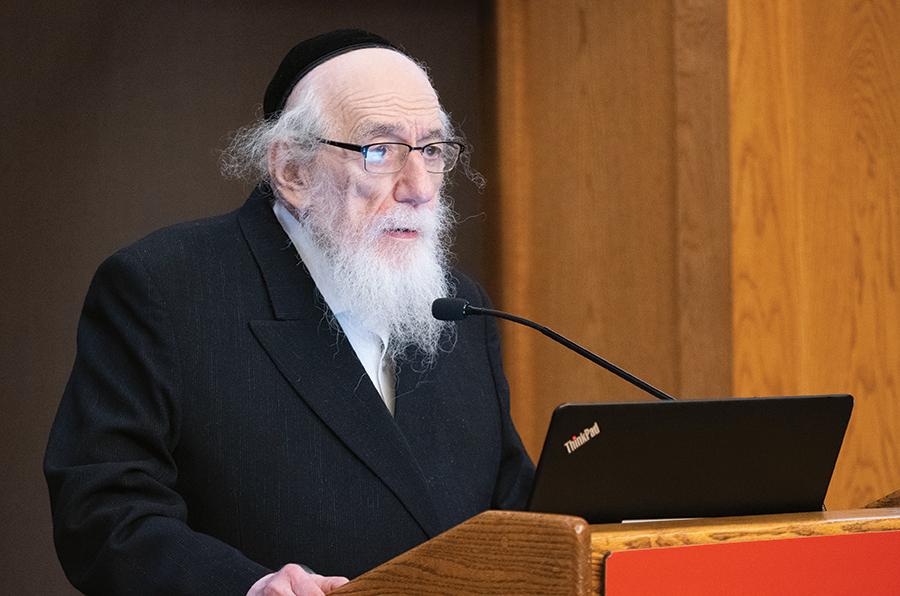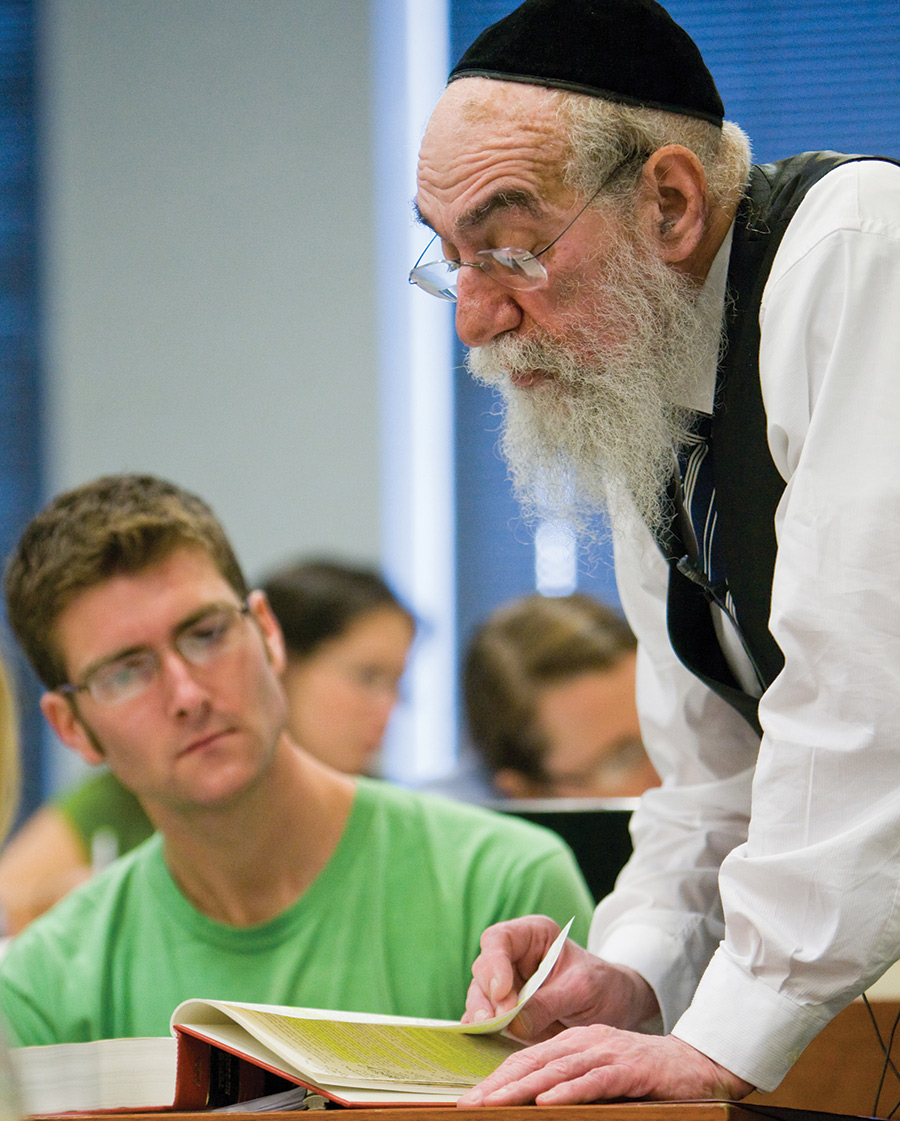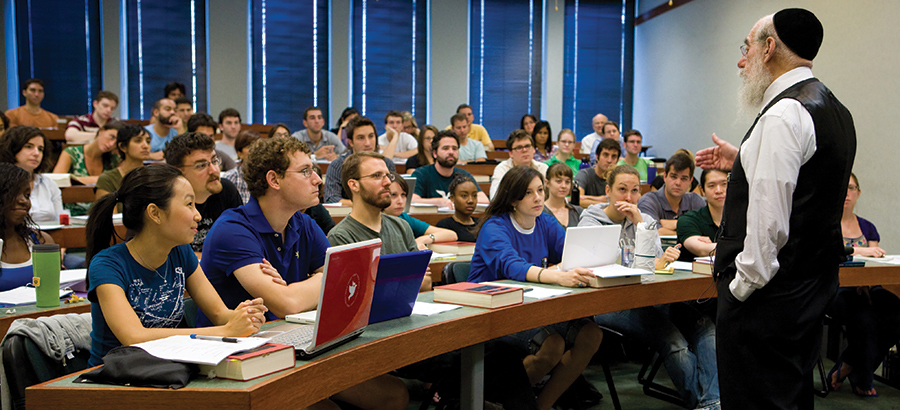The
Faithful
Scholar
Portrait by Todd France
“My father came to Milwaukee from Russia in 1927,” said Twerski, the Irwin and Jill Cohen Professor of Law. “He had infinite love and compassion for people, and they were drawn to him. And so he built a community. My parents’ door was open to everyone from five o’clock in the morning till five o’clock the next morning… and the next. They had ancestors who were outstanding Jewish leaders in Russia and Poland, and they were raised to live for others. It motivated their lives. It was the air that we breathed.”
This spirit of community was the foundation not only for Twerski’s own deep faith and compassion but also for his strong commitment to the field of tort law, for which he has been a powerful voice as a respected lawyer, professor, and scholar for more than 50 years. His attraction to the field as a student was almost instantaneous, when he realized that the often quotidian matters that tort law addresses meant much more than they seemed to mean at first.
“In torts, we take everyday, common affairs and turn them into important law questions both for the individual and for society,” Twerski said. “Within three weeks of studying torts at law school, I knew I wanted to be a professor and teach torts. I was like a fish in the water.”


The symposium brought together scholars from around the country to honor Twerski through the presentation of papers that explored duty, product liability, mass torts, immunity, and conflicts of law, and discussions in which they shared their thoughts on his importance to their own lives and work.
“He is a lion of our faculty and of his field,” said Professor Michael Cahill, who was president and Joseph Crea Dean at the time of the symposium. “He has been and done everything that one can over the course of his distinguished and illustrious career.”
That career began in the mid-1960s, when, after graduating from Marquette University Law School, Twerski joined the U.S. Department of Justice as a trial attorney at the height of the Civil Rights Movement. He brought the first Title VII employment discrimination case in Virginia, and one of the first public accommodation cases in South Carolina.
“Those were heady days,” Twerski said. “We had a lot of responsibility. And I would travel down South to take depositions in areas where they didn’t like the lawyers from the North, and they had never seen a Jew before.”
The experience of being viewed as an outsider was, sadly, not a singular one. In 1967, Twerski went on to excel as a teaching fellow at Harvard Law School. Yet, despite receiving the highest recommendation from Harvard, he, unlike his fellow colleagues, received no offers to join a university faculty. “The head of the teaching fellows program said, ‘You’re not getting offers because they will not hire someone who looks like you,’” Twerski said. “I was shattered.”
In 2019, in accepting Marquette’s Lifetime Achievement Award, he said, “Marquette is extraordinarily hospitable. The school was based on an orthodox religious faith, and they understood not only my appearance and the rest, but that if there was a religious demand made on me, it came first.”
The
Twerski Effect
“Once you take one Twerski class, you tend to sign up for them all,” Kelly said. “As a first-year student, to have him as a torts professor was nothing short of magical. And in case you think I am exaggerating, I will tell you a true story. A classmate of mine once brought a date to Professor Twerski’s class and she wasn’t even a law student or a lawyer. But his class was so good that his pedagogical skills were something that someone chose to use to impress the object of his affection.”
After we posted on social media about the symposium, alumni responded with their own memories of Twerski and his influence on their careers. Here are just a few among the dozens of tributes:
Associate Justice,
Rhode Island Superior Court
Vice President,
Chicago Title Insurance Co.
Senior Director, Brand Partnerships, Lifestyle Expert,
Knocking
Note: In the butterfly test, Twerski said, “I would tell students that in order for a judge to decide certain issues, he/she had to get butterflies in the stomach before making the decision. In other words, the judge had to feel very uncomfortable about making the decision.”
Senior Associate,
Locks Law Firm
Shareholder,
Buchanan Ingersoll & Rooney
Twerski was a special master in the federal case involving more than 10,000 plaintiffs who suffered adverse health effects after being involved in the cleanup of the World Trade Center following the 9/11 terrorist attacks ). Twerski and his colleague created a database of 9/11 victims and the severity of their injuries that served as a model for the current case concerning exposure to tainted water at the Marine Corps Base Camp Lejeune in Jacksonville, N.C.


That distinguished work led to Twerski being awarded the ALI’s prestigious designation of R. Ammi Cutter Reporter. His numerous law review articles and casebooks have covered the landscape of tort law and product liability—from examining the principles of the law of informed consent to the liability of digital platforms such as Amazon as product sellers. His contributions have been noted for their combination of wisdom, pragmatism, and prudent and principled sense of justice. In 2016, he was given the William L. Prosser Award by the Torts Section of the Association of American Law Schools for his outstanding contributions to the field.
Among Twerski’s vast scholarly endeavors, it is teaching that he says is his great love. That love is echoed by his students’ affection for his teaching (see “The Twerski Effect,” p. 33).
“I love the first-year class,” he said. “The students can come in knowing nothing, and by the time they’re finished with the first-year torts course they have been transformed. They learn to be critical thinkers. They learn to question. They ask me, ‘Is this case wrong?’ And I say, in the words of my former teacher Rabbi Nachum Sacks, ‘You’re 100 percent right, but I’ll show you where you’re wrong. I’m going to critique it so that you can decide whether it is right or wrong. But you have to pay attention to the critique and analyze the case with that in mind.’ That’s what I’ve done, and I think students appreciate it. They see their own progress, which is enormous. And when they finally are preparing for exams, they put it all together. It’s an exhilarating experience for students and exhilarating for the professor.”
On any given day, amid his classes and appointments and research, you’ll likely find Twerski on the phone or on Zoom or meeting in person with someone in his community who’s seeking advice—legal, personal, or something in between. As was the case for his parents and his siblings, including the late Dr. Abraham Twerski, a renowned psychiatrist and rabbi who did remarkable work with people facing addiction, and his twin brother, Michel, now the rabbi of the synagogue their father founded, Twerski’s door is always open.